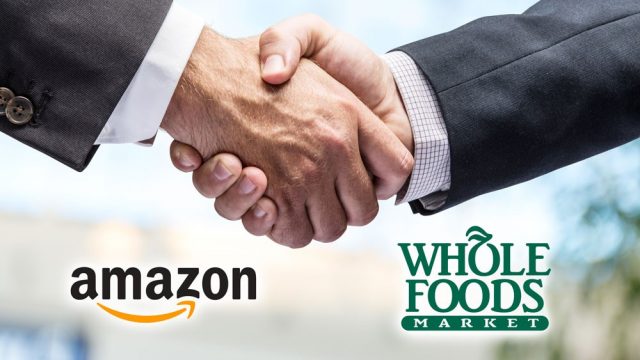The FTC Ruling
Even though there have been some concerns that the Whole Foods Market acquisition will add to Amazon’s increasing retail clout, and about the market power of technology companies such as Alphabet Inc.’s Google and Facebook Inc. in general, the FTC ruling deemed that the combined Amazon-Whole Foods business would own only a small share of the US grocery market and hence, does not warrant close antitrust investigation.
According to the US Census Bureau, the US grocery market is worth approximately $600 billion and Amazon’s total grocery sales were $350 million in the first quarter of 2017, according to OneClickRetail.com, which equates to $1.4 billion annualized.
Adding Whole Foods’ fiscal 2016 revenues and Amazon’s grocery run rate, indicates that the combined entity would generate about $1.7 billion in annual revenues. Still, the combined entity would account for only 4% of the total US grocery market, which is far less that the market shares of Walmart and Kroger, the two leaders in the grocery category.
What the Deal Means for Retail
The deal combines Amazon’s net sales of $79.8 billion in North America last year, with Whole Foods, which had sales of $15.7 billion in fiscal 2016 (September year-end). In fiscal 2016, 97% of Whole Foods’ revenues came from the US and the company recorded net income of $507 million. Within the organic food segment, Whole Foods, and now Amazon, owns about 33% of the $47 billion market.
We can only speculate regarding Amazon’s plans for combining the Whole Foods stores with its own AmazonFresh service, possibly using the stores as distribution hubs to expand its Prime Now service, and integrating the technology currently being tested in its Seattle Amazon Go store. However, the deal will surely intensify the competition for omnichannel offerings in the space, as the grocery incumbents will look to catch up to Amazon’s technological know-how and focus on speed.
Transaction Background
- On June 16, Amazon announced the signing of a definitive agreement to acquire Whole Foods Market, including the company’s net debt, for $13.7 billion in cash.
- Whole Foods, founded in 1978, is the leading natural and organic foods supermarket, with sales of approximately $15.7 billion in fiscal 2016. The company has more than 460 stores in the US, Canada and the UK. Based on data from Deloitte and InsiderMonkey.com, it was the 10th-largest US grocery chain in 2016.
- Amazon’s grocery sales were estimated at $350 million in the first quarter of 2017, representing an annual run rate of $1.4 billion.
